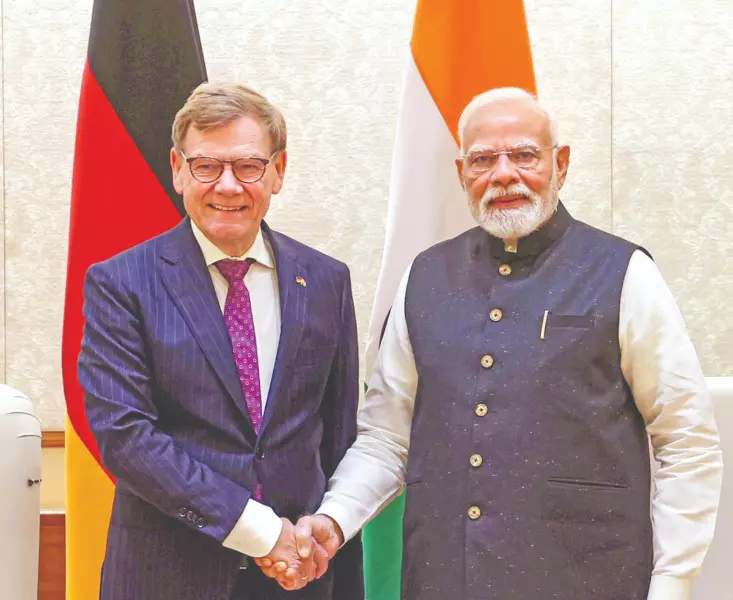‘Immense potential to scale up India-Germany ties’

New Delhi: Prime Minister Narendra Modi on Wednesday underlined the scope for expanding India’s partnership with Germany across trade, technology and sustainability, as the two nations marked 25 years of their Strategic Partnership.
After meeting German Foreign Minister Johann Wadephul in New Delhi, Modi said the relationship carried “immense potential” and reaffirmed India’s commitment to working closely with Berlin in key sectors.
“Delighted to meet German Foreign Minister Johann Wadephul. India and Germany are celebrating 25 years of Strategic Partnership,” the Prime Minister wrote on social media. “As vibrant democracies and leading economies, we see immense potential to scale up mutually beneficial cooperation in trade, technology, innovation, sustainability, manufacturing and mobility.”
The Prime Minister said India and Germany share a vision for a multipolar world and peace-driven global order. He also renewed his invitation to German Chancellor Olaf Scholz for an early visit to India.
Wadephul, who met Modi following wide-ranging talks with External Affairs Minister S Jaishankar, highlighted the progress made in bilateral cooperation and welcomed India’s role in advocating dialogue in global conflicts. “Had great talks with Prime Minister Modi today. Our countries have taken good steps to expand our strategic partnership across the board, particularly in security and defence, economy and trade as well as skilled labour,” the German foreign minister said in a post on X. He also noted Germany’s appreciation of India’s call for a ceasefire in Ukraine.
The meeting came amid heightened geopolitical volatility and economic uncertainty, with both leaders agreeing on the urgency of strengthening strategic and economic ties.
Earlier in the day, Jaishankar and Wadephul held discussions on areas ranging from trade and defence to clean energy and semiconductor manufacturing. The External Affairs Minister said the momentum for a free trade agreement between India and the European Union was gaining ground. “We hope that another round of negotiation takes place fairly soon. We would like this to move to a decisive conclusion in the coming days,” Jaishankar said, noting that Berlin had assured New Delhi of its strong backing in the EU talks.
He added that closer trade links would not only serve mutual interests but also contribute to stability in the global economy. Germany has already expressed confidence that bilateral trade, which touched nearly €50 billion last year, could be doubled in the near future.
Wadephul said Germany valued its partnership with India as one built on “reliability, predictability and friendship” in a period marked by global tensions. “Reliability, friendship, predictability in times like these, in times of uncertainty, in times where we witness wars and conflicts, are of invaluable value,” he told reporters in New Delhi.
He acknowledged that India and Germany do not always align on every aspect of the Ukraine crisis but underlined the importance of open discussions. “Peace is the basis for security, freedom, and prosperity,” Wadephul said. He reiterated that Germany supported India’s right to defend itself against terrorism and stressed Berlin’s commitment to the EU-India free trade pact, saying he hoped negotiations would conclude within the year.
Jaishankar, for his part, said both sides had agreed on expanding defence cooperation and overcoming past hurdles on export clearances, noting that collaboration between industries in both nations was now progressing more smoothly. He also welcomed German interest in semiconductor investments in India, pointing to the potential of Indian talent to contribute to Berlin’s technological capacity.
The two sides also agreed to promote student and academic exchanges, with India announcing gratis visas for short-term school and college visits as part of efforts to enhance people-to-people ties.
Both New Delhi and Berlin framed the day’s talks as an opportunity to inject fresh momentum into their partnership at a time when global economic and political dynamics are shifting rapidly.



